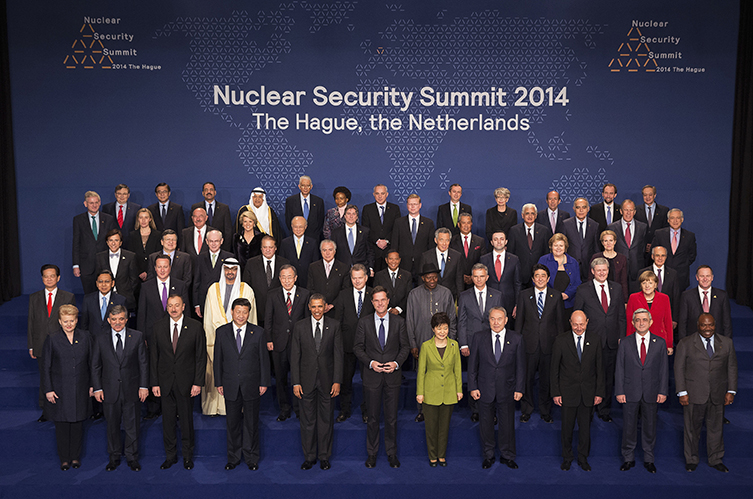The fourth biennial Nuclear Security Summit, to be held in Washington from March 31 to April 1, may well be the last as its chief champion—US President Barack Obama—nears the end of his presidency.
The Nuclear Security Summit (NSS) traces its origins to Obama’s spring 2009 speech in Prague in which he vowed to secure all vulnerable nuclear materials within four years and strengthen the global nuclear security regime. To follow through on this goal, the first NSS was held in Washington in 2010, with subsequent summits held in Seoul in 2012 and The Hague in 2014.
The Summit in Washington later this month will bring together approximately fifty countries—many represented by their heads of state or government—and four international organizations to take concrete steps toward improving global nuclear security.
Nonspecialists often assume that a “nuclear security” summit will cover a broad range of nuclear issues, including nuclear deterrence, arms control, and the North Korean and Iranian nuclear programs. In fact, these summits, and the term “nuclear security,” are more narrowly focused on securing vulnerable nuclear material in order to prevent its proliferation and use in acts of terrorism.
These summits have, therefore, dealt with unglamorous, but important issues, such as: removing highly-enriched uranium from nuclear reactors around the world and replacing them with less sensitive low-enriched uranium fuel; securing radiological materials in civilian uses such as in hospitals; developing new measures to detect and deter nuclear smuggling, including nuclear forensics and radiation detection equipment; strengthening domestic legislation to ensure that national legal frameworks promote nuclear security; and encouraging countries to sign on to multilateral institutions that govern nuclear security, such as the Global Initiative to Combat Nuclear Terrorism.
These summits have advanced global nuclear security in a number of ways. Participating states are required to submit a domestic nuclear security plan. At a minimum, therefore, these summits have encouraged many national governments to seriously consider the global nuclear terror threat and the concrete steps they can take to reduce it. Without these summits, this issue may not have made it on the radar screen of many smaller states, but all states have a role to play in preventing nuclear terror as any country, even those lacking nuclear materials or terrorist activity themselves, could serve as a transshipment hub in a global nuclear material smuggling operation.
Perhaps the most unique and important contribution of the summits, however, is “gift basket diplomacy” in which groups of states make voluntary pledges of concrete steps they will take to improve nuclear security as a gift to the international community. The summits provide an opportunity to issue new pledges and to review progress on past commitments. At what will likely be the final NSS, the Summit in Washington will be mostly focused on the implementation of prior promises.
While the 2016 Summit will demonstrate meaningful progress on nuclear security, it will also be at least partly marred by the absence of a key player. Russia, a major nuclear power which continues to use highly enriched uranium in many of its reactors, has decided to boycott the Summit and is encouraging other countries to do the same. Moscow’s stated justification is that there are sufficient international institutions to address this issue and there is no reason for a single country, the United States, to attempt to assert ownership over the issue through the summit process.
In reality, of course, Russia’s boycott is part and parcel of the broader deterioration in US-Russian relations that began with Russia’s invasion of Ukraine in 2014. This snub reveals much about Russia’s priorities as Moscow has been a valuable participant in previous summits. Given its sprawling nuclear infrastructure and the ongoing threat of terrorism in the Caucuses, Russia still faces a serious nuclear terror threat. Apparently, for Moscow, snubbing Washington is more important than working constructively with the rest of the international community to address the nuclear terror threat.
A final issue will be whether the summit process will continue beyond 2016. While past summits have accomplished much, more work remains to be done. These summits would not have been possible had this issue not been a high priority for Obama. It is unlikely that his successor, whomever that may be, will share the same set of foreign policy priorities. It is hard to see the process continuing, therefore—at least in the current format. Given the demonstrated value of regular meetings to monitor this critical issue for international security, however, it would be valuable to continue a similar process into the future at the working levels of government.
Matthew Kroenig is a Nonresident Senior Fellow in the Atlantic Council’s Scowcroft Center for Strategy and Security.
Image: World leaders and attendees pose for a family photo during the Nuclear Security Summit in The Hague on March 25, 2014. The fourth Nuclear Security Summit will be held in Washington from March 31 to April 1. (Reuters/Doug Mills)

